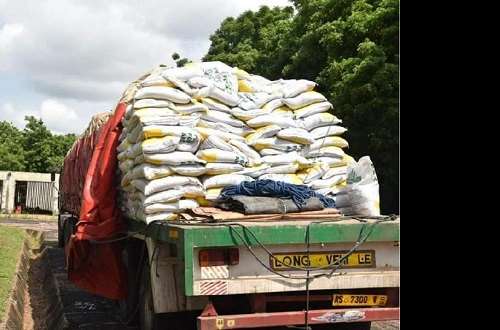• Donkeys transport fertiliser unaided
• Programme targets 1.5m farmers in 2021
• MoFA restricts distribution in 21 districts.
The high rate of fertiliser smuggling to Burkina Faso and Togo is threatening the progress and success of the government’s Planting for Food and Jobs (PFJ) initiative, Director of Crop Services at the Ministry of Food and Agriculture (MoFA) Seth Osei-Akoto has revealed.
MoFA has identified 21 high-risk districts and municipalities in five regions across the country as hotspots where the canker is prevailing.
Six districts in the Upper East Region – Bawku Municipal, Bawku West, Garu, Tempane, Kasena Nankan and Pusiga – are part of the list. In the Upper West Region, Sissala East and Sissala West municipals, Nandom, Lambusie, Nadowli Kaleo and Lawra districts are parts of the exit points; while two districts in the Northern Region, Saboba and Tatale districts; two in North East Region, Chereponi and Bunkpurugu Nakpanduri districts; as well as five in the Volta Region, Ketu North, Ketu South, Akatsi North, Agotime-Ziope and Ho West districts, are culpable.
Mr Osei Akoto who was speaking to the B&FT during a policy dialogue and sensitisation on the 2021 PFJ implementation strategy, and said: “The number of PFJ fertiliser retailers and distributors in these zones will be reduced to curtail the menace, while the various regional security councils have also been called upon to help fight the threat”.
He said the perpetrators are a cartel that has formed a complex system and are using various means to transport the fertiliser through unapproved entry points into Burkina Faso and Togo.
“In the North, some of these smugglers load fertiliser on donkeys. These animals are able to enter Burkina Faso unaided, to deliver the fertiliser. I was there; I saw some of these things, but I can’t question the donkeys,” he disclosed. The challenge, Mr Osei Akoto noted, is causing millions in financial loss and threatening Ghana’s food security.
The Head of Programmes and Advocacy of the Peasant Farmers Association of Ghana (PFAG), Dr Charles Nyaaba, attested that the challenge has undeniably lingered for long. He added that middlemen hoarding the fertiliser and collusion are threatening the initiative.
In a monitoring report, Dr Nyaaba said fertiliser dealers, security officers, opinion leaders and Nation Builders’ Corp (NABCO) personnel are all part of the smuggling alliance.
The PFAG has therefore made a call for increased collaboration with traditional leaders, police officers, farmer groups, assembly members and citizens to further improve monitoring at the community level.
2021 PFJ implementation plan
The government has targetted 1.5 million beneficiary farmers under the subsidy programme in all 16 regions for the 2021 planting season. The target is an improvement against the 1.2 million farmers who benefitted from the initiative in 2020.
A total of 506,000 metric tonnes (MT) of inorganic (chemical) fertilizer – comprising 346,000MT of NPK and 160,000MT of Urea – will be subsidised by the government; while a total of 15,380MT of organic fertiliser (compost- 6000MT; liquid- 3,380MT; granular- 4,500MT; and powder- 1,500MT) will be subsidised.
All NPK formulations and urea will be given to farmers at a subsidised price of GH¢48 per bag 25k. However, the organic variants have different subsidised prices ranging from GH¢7-GH¢55.








